![]() Skype is proudly trumpeting the fact that more than 1,000,000 users have subscribed to SkypeOut, their premium service offering global calling to PSTN numbers for local rates.
Skype is proudly trumpeting the fact that more than 1,000,000 users have subscribed to SkypeOut, their premium service offering global calling to PSTN numbers for local rates.
This makes Skype the 1000lb gorilla of the VOIP-category product, worldwide.
“We’re thrilled about Skype’s growth and credit support from users who have told their friends and family about the cost and quality gains they’ve found with Skype,” cooed CEO and co-founder Niklas Zennström, speaking from the CeBIT tradeshow in Hanover, Germany.
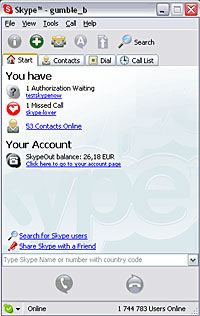 “Our one million SkypeOut users prove that savvy consumers will pay for value – and we will continue to delight users by delivering the software and services they seek to realize the potential of modern communications.”
“Our one million SkypeOut users prove that savvy consumers will pay for value – and we will continue to delight users by delivering the software and services they seek to realize the potential of modern communications.”
Describing themselves as the ‘fastest-growing global communications tool in history’, Skype have got a shedload of facts to back up their claims: the company now boasts more than 29 million registered users and they’re adding more than 155,000 new users per day.
At most times, 2 million people are simultaneously using Skype to connect with friends, family members and colleagues and ‘Skypers’ have now talked for approx six billion minutes.
The company intend to hang on to their numero uno position with soon-to-be-announced new premium offerings and enhancements to the basic free service.
Hotly anticipated is Skype’s new voice messaging service which is currently in beta trial with pundits expecting an April roll out.
New information on Skype’s website has the pricing details:
“The price for Voicemail is 5 Euro for a 3 month subscription or 15 Euro for a 12 month subscription. If your billing address is in the EU, you will be charged 15% VAT when you purchase a Voicemail subscription. Therefore the prices will be €5.75 (US$6.70/£4) for 3 months and €17.25 (US$20/£12) for 12 months. However, a Voicemail subscription comes free with purchase of a SkypeIn number!”
There’s also a new section in the Skype knowledge base describing SkypeIn, the forthcoming additional pay-for service where you can get a phone number and people can call you (similar in concept to what rival Telcos offer).
Skype have also stated their commitment to expanding platforms beyond the Mac, Linux, Windows and Pocket PC platforms currently available, although there’s been no indication of a Palm release (a source of much wailing and gnashing of teeth in the Palm community).
 Unlike the creative whirlwind that accompanied the dot.com explosion, innovation seems to be a lot slower in the 3G content market.
Unlike the creative whirlwind that accompanied the dot.com explosion, innovation seems to be a lot slower in the 3G content market. ITN news got in on the act too, supplementing their mobile news updates with “today in history” style clips trawled from their vast video archives.
ITN news got in on the act too, supplementing their mobile news updates with “today in history” style clips trawled from their vast video archives. AB (formerly ZOOMON), has announced Ikivo Animator for Windows, a Mobile SVG software application for producing high-quality SVG Tiny animations.
AB (formerly ZOOMON), has announced Ikivo Animator for Windows, a Mobile SVG software application for producing high-quality SVG Tiny animations. “Designers have previously been hampered by the lack of visual design tools for authoring mobile SVG content. Working with Adobe, Ikivo is introducing an effective mobile content creation workflow based on Ikivo Animator and Adobe Creative Suite, enabling designers and developers to create extraordinary content for mobile distribution.”
“Designers have previously been hampered by the lack of visual design tools for authoring mobile SVG content. Working with Adobe, Ikivo is introducing an effective mobile content creation workflow based on Ikivo Animator and Adobe Creative Suite, enabling designers and developers to create extraordinary content for mobile distribution.”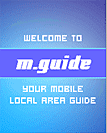 The combination of Adobe’s design and publishing power and Ikivo’s unique Mobile SVG software applications create a fantastic push for overall support of Mobile SVG within the emerging market for 2D based mobile graphics.”
The combination of Adobe’s design and publishing power and Ikivo’s unique Mobile SVG software applications create a fantastic push for overall support of Mobile SVG within the emerging market for 2D based mobile graphics.” With the soaraway success of Skype’s VoIP client, we’ve been waiting for other companies to try and elbow themselves a piece of the action.
With the soaraway success of Skype’s VoIP client, we’ve been waiting for other companies to try and elbow themselves a piece of the action. Sadly, none of the bigger IM networks [AOL/ICQ/Yahoo/MSN Messenger or Skype] use SIP, so you won’t be kissing goodbye to your favourite IM application quite yet.
Sadly, none of the bigger IM networks [AOL/ICQ/Yahoo/MSN Messenger or Skype] use SIP, so you won’t be kissing goodbye to your favourite IM application quite yet.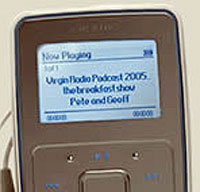 Virgin Radio is making highlights of its breakfast show available for digital audio players like the iPod, in what it claims is a first for “podcasting”.
Virgin Radio is making highlights of its breakfast show available for digital audio players like the iPod, in what it claims is a first for “podcasting”. The BBC has already been experimenting with the new audio distribution model, introducing weekly podcasts of Five Live’s weekly sports quiz Fighting Talk after a successful trial using Melvyn Bragg’s ‘In Our Time’ series on Radio 4, downloaded by more than 70,000 users.
The BBC has already been experimenting with the new audio distribution model, introducing weekly podcasts of Five Live’s weekly sports quiz Fighting Talk after a successful trial using Melvyn Bragg’s ‘In Our Time’ series on Radio 4, downloaded by more than 70,000 users. Although the format is already creating a few podcasting stars, it has to be said that most of the thousands of personal radio broadcasts currently available to download are home-made, rough-edged, and, frankly, pretty crap.
Although the format is already creating a few podcasting stars, it has to be said that most of the thousands of personal radio broadcasts currently available to download are home-made, rough-edged, and, frankly, pretty crap. Unconfirmed reports are suggesting that Virgin Electronics, the consumer electronics division of Virgin, have become an early digital music casualty with the division discontinuing its product line.
Unconfirmed reports are suggesting that Virgin Electronics, the consumer electronics division of Virgin, have become an early digital music casualty with the division discontinuing its product line.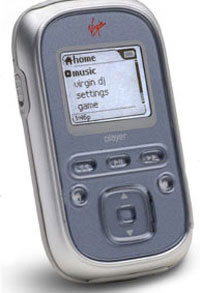 The company had pinned their hopes on the well-reviewed “Virgin player 5GB”, which had the audacity to try and take the iPod mini head-on.
The company had pinned their hopes on the well-reviewed “Virgin player 5GB”, which had the audacity to try and take the iPod mini head-on. Apple Computer shares dropped Tuesday as Sony relaunched its famous Walkman line amongst concerns that increased competition from Napster might impact its dominance of online music and portable players.
Apple Computer shares dropped Tuesday as Sony relaunched its famous Walkman line amongst concerns that increased competition from Napster might impact its dominance of online music and portable players. Over the last twelve months, Apple’s share price has gone from US$23 (€17/£12) to an all-time high of US$81.99 (€61/£42) just before the split was announced.
Over the last twelve months, Apple’s share price has gone from US$23 (€17/£12) to an all-time high of US$81.99 (€61/£42) just before the split was announced. (CeBIT, Hannover) Wandering around the Sony products at the pre-CeBIT press conference, I came across the DSC-T7, the smallest, sexiest model whos roots lay with the DSC-T1.
(CeBIT, Hannover) Wandering around the Sony products at the pre-CeBIT press conference, I came across the DSC-T7, the smallest, sexiest model whos roots lay with the DSC-T1. a sliding cover that both covers and protects the lens and switches the camera on. Measuring only 14.8 mm / 0.6 in at the lens cover, and 9.8 mm / 0.4in for the main body, it packs 5.1m pixel. The back is taken up with a 2.5″ TFT Hybrid LCD, displaying 230,000 pixels.
a sliding cover that both covers and protects the lens and switches the camera on. Measuring only 14.8 mm / 0.6 in at the lens cover, and 9.8 mm / 0.4in for the main body, it packs 5.1m pixel. The back is taken up with a 2.5″ TFT Hybrid LCD, displaying 230,000 pixels.
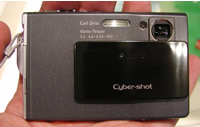 Nothing definite on release dates or price but the talk in the corridors is it should be around in May for around 375Euro, $500, 260 UKP.
Nothing definite on release dates or price but the talk in the corridors is it should be around in May for around 375Euro, $500, 260 UKP. An episode of the new series of the sci-fi drama Doctor Who has been leaked onto the Internet, three weeks before the series is expected to begin on BBC One.
An episode of the new series of the sci-fi drama Doctor Who has been leaked onto the Internet, three weeks before the series is expected to begin on BBC One. The eagerly awaited new series, filmed in Wales, features the well respected actor Christopher Eccleston as Dr Who, with former teen pop singer Billie Piper as his assistant.
The eagerly awaited new series, filmed in Wales, features the well respected actor Christopher Eccleston as Dr Who, with former teen pop singer Billie Piper as his assistant.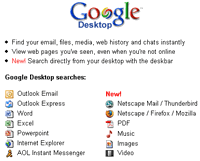 Google has taken its free desktop search tool out of beta and unveiled a finalised version capable of searching the full text of pdf files and the metadata of multimedia files.
Google has taken its free desktop search tool out of beta and unveiled a finalised version capable of searching the full text of pdf files and the metadata of multimedia files.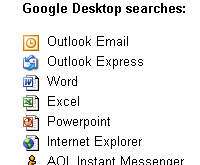 Other improvements in the Google desktop tool are support for Mozilla’s Firefox and Thunderbird applications and AOL’s Netscape browser and e-mail application (previously, the product only supported Internet Explorer and Outlook/Outlook Express).
Other improvements in the Google desktop tool are support for Mozilla’s Firefox and Thunderbird applications and AOL’s Netscape browser and e-mail application (previously, the product only supported Internet Explorer and Outlook/Outlook Express).